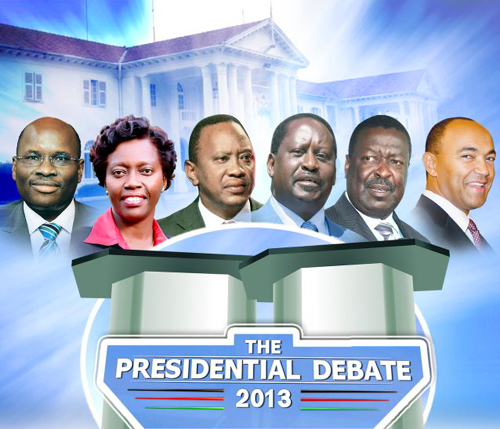
The crazies looked crazier, the ones who quoted scripture couldn’t quote GDP numbers, every pot called every kettle black, the smart drowned in their own moderation, none seemed to know all the words to the national anthem, the self-appointed media hosts deservedly lost control, and the winners are still winning and the losers are still lost.
Unlike America, though, polling this close to the March 4 election is now banned in Kenya, so it took outsider polls of little repute and no published evidence to proclaim the winners and the losers.
So I will.
The debate lasted 3 hours (see below for my cheat sheet onto YouTube) and I watched it from start to finish after just arriving Cape Town following two days of constant traveling while eating delectable fresh calamari and hake and Cape greens quickly and cheaply bought at the Waterfront’s Pick ‘n Pay, liberally lubricated with a local vineyard cab.
I know. How could anyone sane not watch sunset over Table Mountain because Uhuru Kenyatta was explaining how he would be president while being tried at The Hague for crimes against humanity?
Me. And literally thousands of South Africans, by the way, as local TV (SA2) carried much of the debate and this morning’s talk shows were filled with discussion about it.
The outcome of the Kenyan election is going to effect the entire continent. I really believe that the winners of last night’s debate, Prof. James Kiyiapi and youngster Peter Kenneth, have no chance of winning the election.
Forty million Kenyans watched the eight candidates debate live. It’s unlikely 10% of the voters were moved away from their predetermined vote, which is based on their tribe. But that’s the marvel of Kenya, being able to undo its misery precisely because it’s so pervasive: neither of the two major tribes are large enough to produce a majority.
So the 10% could matter. Although not as you might think.
If none of the 8 candidates gets a majority, which is becoming increasingly likely, then there must be a runoff election. And the losers in the first round will likely make alliances with the winners of the first round. “Endorsements” by those dropping out of the race actually then have a much greater impact than in the American election.
Raila Odinga, a Luo and the current prime minister, remains the favorite of the eight candidates. He is followed closely by Uhuru Kenyatta, a Kikuyu who is under indictment for allegedly having incited the violence that followed the last election in 2007.
The candidates I saw as winners, and I’m sure who were also deemed that by Kenya’s rapidly growing very youthful educated middle class, come from relatively small ethnic groups.
Kiyiapi is a Maasai. Kenneth is a mullato. Kiyiapi is one of the smartest Kenyans I’ve ever listened to, a college professor. Kenneth is quick and witty, and one of Kenya’s most successful and prominent businessmen.
The two were the most articulate. Both knew the facts (few of the remaining did) and both are left-of-center populists who would further tax the rich and redistribute wealth in ways to alleviate poverty.
There was actually not a lot of disagreement among any of the candidates regarding policies, whether that be taxation or redistribution, education or security.
And that’s because the aggrieved poor in a developing country can simply not be ignored. They can’t be ignored out of simple humanity, but also because their numbers are large enough to start a revolution if progress on their behalf does not occur fast enough.
But everyone knows that regardless of what’s said, there are the lefties like Odinga, Kipiyia and Kenneth; and there are the righties like Kenyatta.
And so if I’m right, and if Kenneth and Kipiyia were the winners last night, then in a second round the people watching like me who felt the same are likely to support Odinga over Uhuru.
All I hope is that Kenyatta does not win. He is responsible for the last election violence; he’s a slick and evil man. He will set Kenya back into the times of his father, the first president of the country, when there were only two tenants of governance: nepotism and corruption.
The next and final debate is February 25.
Click here for yesterday’s full debate.
10m35s : The candidates get two minutes each to introduce themselves.
16m00s : The candidates discuss tribalism which quickly devolved into the issue of Kenyatta’s candidacy and position in the current government as deputy prime minister, even while being tried in The Hague for having incited such violence in the last election.
It’s important to note that Kenya could have tried Kenyatta and the five others itself in Kenya with its own justice system, but that Parliament voted not to, defaulting to a treaty provision that then allowed the World Court to hold the trial.
19m48s: Kenyatta’s defense of his candidacy
34m35s: the media host challenges Kenyatta to explain tribal remarks he has made in the current campaign.
At 53m35s Kenyatta contends, “The people have the confidence that I can discharge my duties while clearing my name.”
At 57m30s Odinga quips that it would be hard for Kenyatta to “run a country by Skype from The Hague” which presumes he will be convicted and jailed there.
At the 1hr30m00s mark the moderator gives the floor to Kenyans in the hall for their own questions about security, education and health care.
Familiar?
Yes, but the good stuff was then over. There was little disagreement on the policies the government should take on any of the public questions.